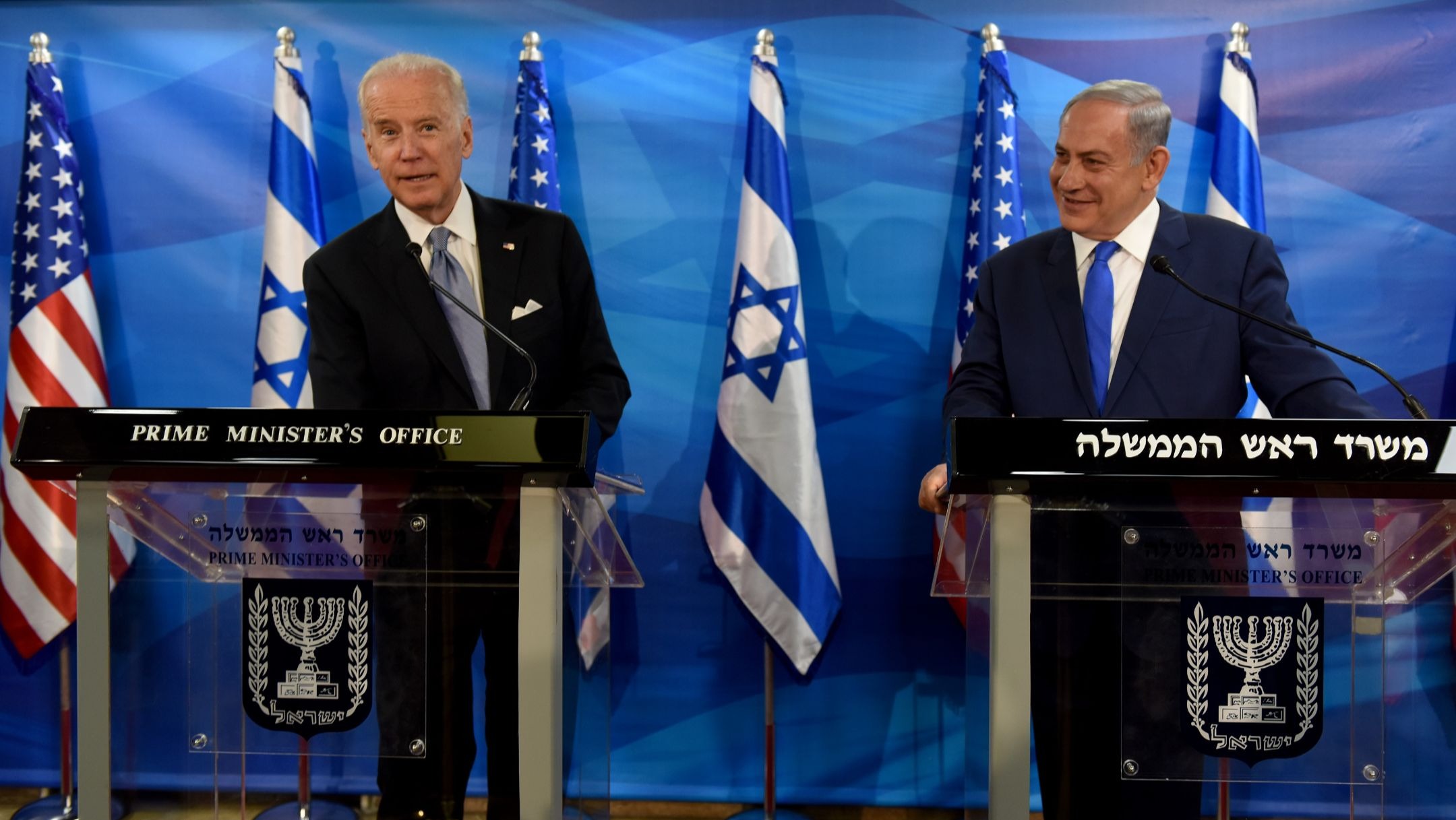Netanyahu, Biden to discuss Saudi deal, Palestinians at UN meeting amid major anti-coup protest
Biden is expected to ask Netanyahu if his government is capable of taking significant steps on the Palestinian issue, as part of talks over a normalization deal with Riyadh

Then-Vice President Joe Biden, left, and Israeli Prime Minister Benjamin Netanyahu give joint statements to the press in the prime minister’s office in Jerusalem, on March 9, 2016. Photo by Debbie Hill/AFP via Getty Images
This article originally appeared on Haaretz, and was reprinted here with permission. Sign up here to get Haaretz’s free Daily Brief newsletter delivered to your inbox.
Israel’s Prime Minister Benjamin Netanyahu will meet U.S. President Joe Biden on Wednesday for the first meeting between the two leaders since Netanyahu took office nine months ago.
The meeting will be held on the sidelines of the UN General Assembly in New York, and is expected to focus on talks over a U.S.-Saudi-Israeli deal, tensions revolving around the Palestinian issue and the Biden administration’s objections to the Israeli government’s steps against the country’s judicial system.
In the schedule released by the Prime Minister’s Office, the meeting is expected to last about an hour.
Biden and Netanyahu have known each other for decades, and have, in the past, referred to one another as friends. In recent months, however, Biden has expressed sharp criticism of Netanyahu’s current cabinet, calling it the most extreme Israeli government he has yet to work with.
Biden has also called on Netanyahu to halt the judicial coup and refrain from making changes that do not have broad public support. In March, Biden said Netanyahu would not be invited to the White House in the near future.
After a phone call between the two leaders last July, Netanyahu’s office announced that Biden has extended him an invitation for a U.S. visit. Senior Israeli government members also claimed that Biden had invited Netanyahu to the White House, but the Biden administration clarified that the two will meet on U.S. soil, and not necessarily in the capital.
The White House had debated inviting Netanyahu for an official Washington D.C. visit – a step that reflects the close ties between Israel and the U.S. – or suffice with a meeting at the UN General Assembly which holds less diplomatic significance.
In the end, the latter was chosen – also amid concerns over large-scale protests outside the White House spearheaded by Israelis and U.S. Jews opposed to the judicial coup.
Sources in the U.S. administration told Haaretz this week that Biden is expected to ask Netanyahu if his government is capable of taking significant steps on the Palestinian issue, as part of negotiations over a deal with Saudi Arabia. This question became particularly apt on Monday following statements by Saudi Foreign Minister Prince Faisal bin Farhan Al-Saud.
Speaking at a New York summit organized by the Kingdom and the EU that focused on the two-state solution, bin Farhan said Riyadh is committed to such a resolution and that it “must return to the forefront.” These statements run counter to the Netanyahu government’s stance – a government which includes extremist ministers who reject any connection between the Palestinian issue and talks with Saudi Arabia.
Meanwhile, the London-based Middle East Eye reported that Turkish President Recep Tayyip Erdogan has also expressed support for normalization between Jerusalem and Riyadh.
Biden and Erdogan met in New York on Tuesday – the first meeting between the two leaders, who until now have only spoken to each other by phone.
Another complex issue expected to be raised in the meeting between Biden and Netanyahu is the Saudi demand for a civilian nuclear program, including uranium enrichment. Mossad head David Barnea, who has joined Netanyahu in New York, is expected to attend at least part of the meeting.
Barnea was already invited to the White House around two months ago to present the U.S. with the Israeli defense establishment’s position on the matter.
On Tuesday, the New York Times reported that the Biden administration is considering a defense pact with Saudi Arabia, similar to the pact the U.S. has with South Korea. Seoul, however, has never received American approval to enrich uranium on its soil, despite sharing a border with nuclear-armed North Korea.
Nuclear experts in Israel and the U.S. have cautioned that an American green light for uranium enrichment in Saudi Arabia could lead other countries, including South Korea, to issue a similar demand from Washington.
On Tuesday, Netanyahu met with German Chancellor Olaf Scholz and Ukrainian President Volodymyr Zelenskyy. While the meetings were underway, various anti-Netanyahu protests were held around New York City, including in front of his hotel and across the UN building.
The protests are expected to continue in the coming days, with a major demonstration to be held Wednesday during Netanyahu’s meeting with Biden. Netanyahu will speak at the General Assembly on Friday, and will fly back to Israel on Saturday night.














